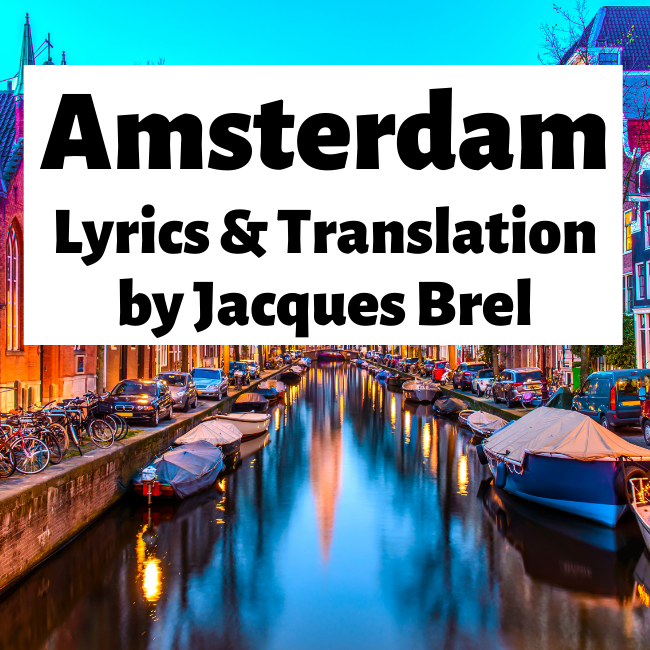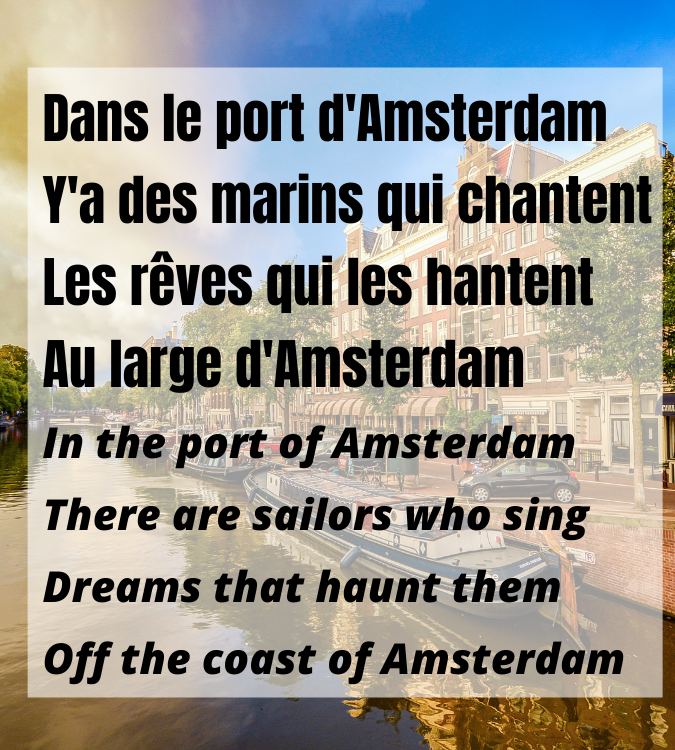Song overview
“Amsterdam” (Also called “The Port of Amsterdam) is one of Belgian singer Jacques Brel’s (1929 – 1978) most famous songs after “Ne Me Quitte Pas”. Brel never recorded the song for an album but performed it on live album Enregistrement Public à l’Olympia (1964). The song’s lyrics recount the exploits or sailors on shore leave in Amsterdam.

Notable English recordings of Amsterdam were made by David Bowie (released in 1973) and John Denver (released in 1970). The English version lyrics were translated by Mort Shuman.
Further down this page below the lyrics analysis we’ve included the lyrics to both the French and English versions of the songs. We’ve also included YouTube videos of Jacques Brel, David Bowie and John Denver singing the song. We also provide extensive analysis of the French lyrics.
Jacques Brel sang the original French version of “The Port of Amsterdam”.

Amsterdam lyrics analysis (French version)
In the song’s lyrics, Brel sings about sailors visiting the port of Amsterdam. He describes the way they eat, drink, dance and carouse with the women.
In the following paragraphs, we’ll look at select lines of the song lyrics’ vocabulary and grammar.
Dans le port d’Amsterdam
Each verse of the song starts with “Dans le port d’Amsterdam” (in the port of Amsterdam). Apparently, the original lyrics to the song used Antwerp, a port in Belgium.
Y’a des marins qui chantent
This line translates to “there are marines who sing”. “Y’a” is a shorted or oral form of il y a, which means both “there is” and “there are”.
Les rêves qui les hantent
This line means “the dreams that haunt them”. The les in this line is a direct object pronoun (them in this case) and not a definite article meaning “the”.
Au large d’Amsterdam
This line translates to “off the coast of Amsterdam”. “Au large de” is an expression that means “off the coast of”.
Y’a des marins qui dorment, Comme des oriflammes
These two lines translate to “There are sailors who sleep like banners. An “orniflamme” is a pointed red banner used in the Middle Ages.
Le long des berges mornes
This line translates to “along the gloomy banks”. “Morne” translates to gloomy, bleak and dreary.
Aux premières lueurs
This line translates to “at the first light of dawn”. The word “lueur” translates to glow or gleam.
Dans la chaleur épaisse
These two lines were difficult to translate. “Dans la chaleur épaisse” translates to “In the thick heat”. The adjective “épais” means thick.
Des langueurs océanes
This line translates to “Of the dreaminess oceans“. “Langeur” has multiple translations including languor, dreaminess, sluggishness and slowness.
Des poissons ruisselants
This interesting line translates to “Dripping fish”. The adjective “ruisselant” has several translations including streaming, running, free-flowing, dripping, covered in and soaked in.
A décroisser la Lune
This was another difficult line to translate. We translated it to “That can twist off the moon”. We were actually unable to find the verb “décroisser” on any online dictionary. The verb “décroiser” with a single -s. means to uncross or unfold (the arms).
A bouffer des haubans
This line translates to “That can eat shrouds”. The word “hauban” translates to sailing shrouds, which are cables and riggings.
Et ça sent la morue
We translated this line to “And you can smell the codfish”. The verb “sentir” means both to feel and to smell. The literal translation of “ça sent” is “that smells”.
Jusque dans le cœur des frites
This line translates to “Until the heart of the French fries”. The word “cœur” means heart. It was difficult find the exact meaning of the word in the context of this line.
Puis se lèvent en riant
This line means “Then they stand up laughing”. “En rian” is the gerund of the verb rire (to laugh) and translates to “while laughing”.
Referment leur braguette
This line translates to “Zipping up their flies”. The word “braguette” means zipper. This line underscores the perceived crudeness of the sailors in Amsterdam.
Et sortent en rotant
This line translates to “And walking out burping”. This is an other example of the gerund. The verb “roter” means to burp or belch.
En se frottant la panse, Sur la panse des femmes
These two lines describe the sailors dancing in Amsterdam. The lines translate to “And rub their stomachs, On the stomachs of ladies”. The verb “frotter” means to rub and “panse” is slang for belly or stomach.
Comme des soleils crachés, Dans le son déchiré
This line translates to “Like spitting suns, In the torn sound”. The lyricist is describing how the sailors danced. We are not sure of the imagery which he is trying to suggest. “Cracher” means to spit and “Déchirer” means to rip.
D’un accordéon rance…L’accordéon expire
These two lines translate to “Of a rancid accordion…The accordion dies”. Again, we believe the lyricist is describing the crudeness of the music to which the sailors danced.
Ils ramènent leur batave
This line translate to “They bring back their Dutch girl”. Here, the lyricist is describing the sailors’ behavior with the working women of Amsterdam. The word “batave” describes being Dutch, or from the Netherlands.
Y’a des marins qui boivent, Et qui boivent et reboivent, Et qui reboivent encore
These three lines translate to “There are sailors who drink, And who drink and drink again, And who still drink again”. Here, the lyricist is describing the sailors excessive drinking by playing with words. “Reboire” means “to drink again”. Then, he adds the word “encore”, which also means again.
Qui leur donnent leur vertu
We translated this line to “Who give them their virginity”. This line is talking about the women of Amsterdam giving their bodies to the sailors. “Vertu” translated to virtue and property. However, in old French it translates to virginity.
Se plantent le nez au ciel, Se mouchent dans les étoiles, Et ils pissent comme je pleure
These three lines translate to “They stand with their noses to the sky, Blow their noses to the stars, And pee like I’m crying”. Again, the lyricist is describing the sailors crude drinking behavoir.

Amsterdam lyrics (original French with English translation)
Lyrics translated by: David Issokson
Dans le port d’Amsterdam
Y’a des marins qui chantent
Les rêves qui les hantent
Au large d’Amsterdam
In the port of Amsterdam
There are sailors who sing
Dreams that haunt them
Off the coast of Amsterdam
Dans le port d’Amsterdam
Y’a des marins qui dorment
Comme des oriflammes
Le long des berges mornes
In the port of Amsterdam
There are sailors who sleep
Like banners
Along the gloomy banks
Dans le port d’Amsterdam
Y’a des marins qui meurent
Pleins de bière et de drames
Aux premières lueurs
In the port of Amsterdam
There are sailors who ide
Full of beer and drama
At the first light of dawn
Mais dans le port d’Amsterdam
Y’a des marins qui naissent
Dans la chaleur épaisse
Des langueurs océanes
But in the port of Amsterdam
There are sailors who are born
In the thick heat
Of the dreaminess oceans
Dans le port d’Amsterdam
Y’a des marins qui mangent
Sur des nappes trop blanches
Des poissons ruisselants
Ils vous montrent des dents
A croquer la fortune
A décroisser la Lune
A bouffer des haubans
In the port of Amsterdam
There are sailors who eat
On white table clothes
Dripping fish
They show you their teeth
That can bite into fortune
That can twist off the moon
That can eat shrouds
Et ça sent la morue
Jusque dans le cœur des frites
Que leurs grosses mains invitent
A revenir en plus
Puis se lèvent en riant
Dans un bruit de tempête
Referment leur braguette
Et sortent en rotant
And you can smell the codfish
Until the heart of the French fries
That their big hands invite
To comeback for more
Then they stand up laughing
In the noise of the storm
Zipping up their flies
And walking out burping
Dans le port d’Amsterdam
Y’a des marins qui dansent
En se frottant la panse
Sur la panse des femmes
Et ils tournent et ils dansent
Comme des soleils crachés
Dans le son déchiré
D’un accordéon rance
Ils se tordent le cou
Pour mieux s’entendre rire
Jusqu’à ce que tout à coup
L’accordéon expire
In the port of Amsterdam
There are sailors who dance
And rub their stomachs
On the stomachs of ladies
And they turn and they dance
Like spitting suns
In the torn sound
Of a rancid accordion
They twist their necks
To better hear themselves laughing
Until suddenly
The accordion dies
Alors le geste grave
Alors le regard fier
Ils ramènent leur batave
Jusqu’en pleine lumière
Then with a solemn movement
Then with a proud look
They bring back their Dutch girl
Into the open light
Dans le port d’Amsterdam
Y’a des marins qui boivent
Et qui boivent et reboivent
Et qui reboivent encore
Ils boivent à la santé
In the port of Amsterdam
There are sailors who drink
And who drink and drink again
And who still drink again
They drink to health
Des p*tains d’Amsterdam
De Hambourg et d’ailleurs
Enfin ils boivent aux dames
Qui leur donnent leur joli corps
Qui leur donnent leur vertu
Pour une pièce en or
The wh*res of Amsterrdam
Of Hamburg and elsewhere
In the end they drink to ladies
Who give them their pretty bodies
Who give them their virginity
For a piece of gold
Et quand ils ont bien bu
Se plantent le nez au ciel
Se mouchent dans les étoiles
Et ils pissent comme je pleure
Sur les femmes infidèles
And when they’ve really drank
They stand with their noses to the ski
Blow their noses to the stars
And pee like I’m crying
On the unfaithful ladies
Dans le port d’Amsterdam
Dans le port d’Amsterdam
In the port of Amsterdam
In the port of Amsterdam
Listen to the song Amsterdam by Jacques Brel
The following is a YouTube video of Amsterdam by Jacques Brel. Follow along as you read the French and English lyrics above!
Here you can listen to the song on Spotify:
English versions of the Port of Amsterdam
David Bowie and John Denver both released English versions of the song Amsterdam.
David Bowie’s version:
John Denver’s version:
Port of Amsterdam – English Lyrics
The following are the English lyrics to the Port of Amsterdam, translated by Mort Shuman.
In the port of Amsterdam
There’s a sailor who sings
Of the dreams that he brings
From the wide-open sea
In the port of Amsterdam
There’s a sailor who sleeps
While the river bank weeps
To the old willow tree
In the port of Amsterdam
There’s a sailor who dies
Full of beer, full of cries
In a drunken town fight
In the port of Amsterdam
There’s a sailor who’s born
On a hot muggy morn
By the dawn’s early light
In the port of Amsterdam
Where the sailors all meet
There’s a sailor who eats
Only fish heads and tails
And he’ll show you his teeth
That have rotted too soon
That can haul up the sails
That can swallow the moon
And he yells to the cook
With his arms open wide
“Hey, bring me more fish
Throw it down by my side”
And he wants so to belch
But he’s too full to try
So he stands up and laughs
And he zips up his fly
In the port of Amsterdam
You can see sailors dance
Paunches bursting their pants
Grinding women to porch
They’ve forgotten the tune
That their whiskey voice croaked
Splitting the night
With the roar of their jokes
And they turn and they dance
And they laugh and they lust
Till the rancid sound of the accordion bursts
And then out of the night
With their pride in their pants
And the sluts that they tow
Underneath the street lamps
In the port of Amsterdam
There’s a sailor who drinks
And he drinks and he drinks
And he drinks once again
He’ll drink to the health
Of the whores of Amsterdam
Who’ve given their bodies
To a thousand other men
Yeah, they’ve bargained their virtue
Their goodness all gone
For a few dirty coins
Well, he just can’t go on
Throws his nose to the sky
And he aims it up above
And he pisses like I cry
On the unfaithful love
In the port of Amsterdam
In the port of Amsterdam
Discover more French song lyrics:
- Ne Me Quitte Pas (Jacques Brel)
- C’est Si Bon (Yves Montand)
- La Vie en Rose (Edith Piaf)
- Non, Je Ne Regrette Rien (Edith Piaf)
- La Bohème (Charles Aznavour)
- Les Feuilles Mortes (Yves Montant)
- La Mer (Charles Trenet)
- Les Champs Élysées (Joe Dassin)
- Top French songs of all time
